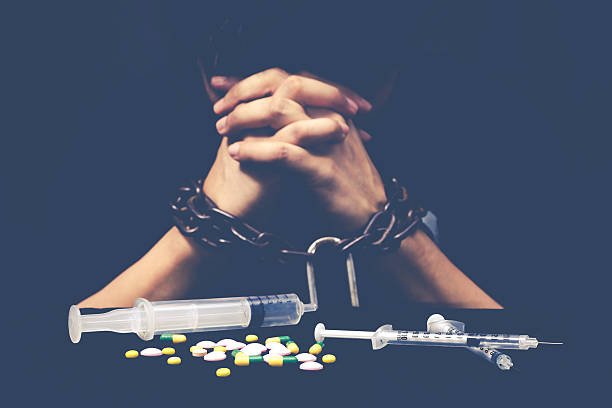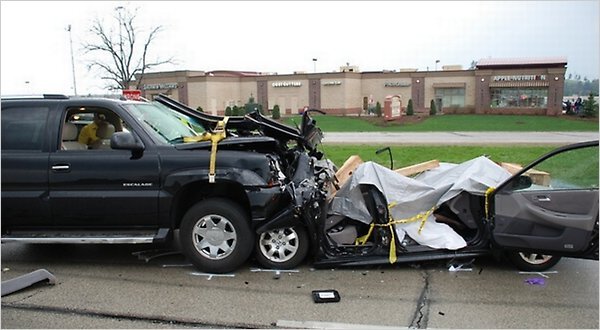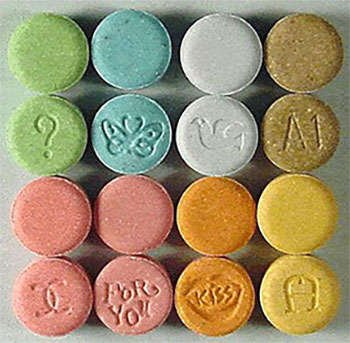DRUG ABUSE AND ADDICTION
Abuse is coined from the term 'Abnormal use'. Ab-Use.
Since there is an abnormal use, there will definitely be a normal use.
Taking Drugs according to the doctor's/expert's prescription (i.e. in the normal quantity and at the right time) is the normal use of drugs, but doing opposite of this is drug abuse.
Abuse is quiet different from addiction. Addiction is a recognized condition involving compulsive use of a substance despite negative consequences. Drug abuse is the inappropriate use of substances– including alcohol, prescription medication, or illegal drugs – for purposes such as pleasure, to feel or perform better in certain situations, or to change one’s perception of reality.
Abusing substances creates both changes in behavior and in the way the brain works, specifically in the areas governing judgment and reward. Continued abuse of substances can be a warning sign that an individual is beginning to lose control over their drug use.

source: https://www.google.com/search?q=drug+abuse&source=lnms&tbm=isch&sa=X&ved=0ahUKEwjdlov-lJfcAhUGLY8KHbqUD8UQ_AUICigB&biw=1338&bih=593#imgrc=N_C9v1EUnZZHzM:
Facts on Drug Abuse and Addiction
Drug abuse does not only affects the individual, but also have far-reaching consequences that affects the family, employment, personal health, health care systems, local communities, and the society at large. The following examples shows the potentially profound impact of substance abuse at an individual and societal level, including the toll it may take on health and family.
Misuse of alcohol and illicit drugs affects society through costs incurred secondary to crime, reduced productivity at work, and health care expenses.
Substance abuse and addiction also affects other areas, such as broken families, destroyed careers, death due to negligence or accident, domestic violence, physical abuse, and child abuse.
Drug abuse and addiction changes one's brain chemistry. The longer you use your drug of choice, the more damage is done – and the harder it is to go back to “normal” during drug rehab.
Drug abuse and addiction is a chronic, relapsing, compulsive disorder that often requires formal treatment, and may call for multiple courses of treatment.
Substance use disorders are treatable. Effective treatment can be found from a comprehensive rehabilitation program that is tailored to meet one's specific needs
Symptoms of Drug Abuse
Depending upon one's drug of choice, the symptoms that suggest the presence of an addiction that requires treatment will vary. Different classes of drugs have different telltale signs that signify usage.
In general, however, there are a number of signs that drug abuse or alcohol abuse is a serious problem. If you recognize some or all of the following things happening to someone you care about, or happening in your own life, drug abuse may be an issue that needs to be addressed in treatment:
- Isolating from family and friends who don’t use drugs
- Spending time with new friends or friends who get high or drink
- Never having money or often asking to borrow money, even for small items
- Showing up late to work/school or not showing up at all
- Losing a job
- Doing little to find a job if out of work
- Paying less attention to basic hygiene
- Changes in sleeping habits
- Extremely private about possessions, including their bag, room, or car
- Lying about using or drinking
- Sneaking away to get high or drunk
Drug Consumption and Drug Addiction
Diagnosis of a substance use disorder requires that two or more of the symptoms frequently associated with problematic substance use occur simultaneously within a 12-month period of time. These symptoms include:
- Tolerance for the drugs they consume.
- Withdrawal symptoms when the drugs are not consumed.
- Loss of control when using drugs.
- Inability to stop using.
- Strong cravings or urges to use.
- Inability to perform duties within the family, at work, or at school.
- Scaling back on drug use behavior is, for so many addicted individuals, extremely difficult. Even if successful, simply taking less or “cutting back” on the substance use will not solve these problems. For instance, merely cutting back on certain types of drug use will not eliminate or reduce the risk of permanent brain damage or disease of the vital organs.
Even those who occasionally abuse drugs might suffer from one or more of the aforementioned symptoms.
For instance, loss of control when using drugs may constitute a drug user’s inability to choose their responsibilities for work, school or children over their drug use. The drug abuser may have little ability to control their decision to obtain drugs and use, rather than helping their child with homework or going to work to support their family.
Periodic drug abuse can have consequences that rival those seen in cases of full-blown addiction, depending upon the individual and the circumstances.
Unseen Dangers of Drug Abuse
Drug abuse can obviously lead to health problems involving the liver, kidney and other major organs.
However, there are other dangers that can come from the abuse of drugs or alcohol that many individuals do not consider. For instance, drug abuse can lead an individual to make risky decisions that place them into dangerous situations, along with those around them. These decisions can have lasting impacts on a variety of situations.
An individual who abuses substances by injecting directly into muscle tissue or veins drastically increases their risk of infection, and sharing needles can easily transmit HIV/AIDS and chronic hepatitis viruses. Substances often impair judgment and decision-making, leading users to make unsafe choices.

https://www.medicaldaily.com/drug-addiction-alcohol-abuse-break-cycle-383045
When an individual is under the influence of drugs or alcohol, they may be more likely to underestimate the effects of the substance on reaction time and judgment, leading them to drive under the influence.
In the United States for instance, 29.1 million people admitted to driving under the influence of alcohol in 2012. In 2012, almost 10 million Americans over the age of 12 admitted to driving under the influence of illicit drugs in the last year.

https://www.google.com/search?biw=1338&bih=593&tbm=isch&sa=1&ei=uAlGW6qrCcnovATq_p74CQ&q=driving+as+a+side+effect+of+drug+abuse&oq=driving+as+a+side+effect+of+drug+abuse&gs_l=img.3...121113.131543.0.131946.19.17.0.0.0.0.620.620.5-1.1.0....0...1c.1.64.img..18.0.0....0.G8cw0h1RK-c#imgrc=BeBnhJIXV92mrM:
Drug Abuse and Brain Damage
Brain damage is a significant risk of drug abuse.
The use of cocaine for example, can cause strokes so small they often go unnoticed, but result in brain tissue death, and the gradual accumulation of neurological deficits nonetheless. MDMA [(Ecstasy) 3,4-methylenedioxy-methamphetamine (MDMA) is a synthetic drug that alters mood and perception (awareness of surrounding objects and conditions). It is chemically similar to both stimulants and hallucinogens, producing feelings of increased energy, pleasure, emotional warmth, and distorted sensory and time perception. https://www.drugabuse.gov/publications/drugfacts/mdma-ecstasymolly]
https://www.drugabuse.gov/publications/drugfacts/mdma-ecstasymolly]
can disrupt the brain’s ability to normally produce serotonin, a chemical responsible for equalizing mood, aggression and other emotions. This can lead users to being unable to control or experience normal emotions without the use of the drug.
Some drug users will engage in reckless activities such as binge use of certain drugs or alcohol. When this happens, even if the individual does not meet the diagnostic criteria for a substance use disorder, the activity may result in irreversible brain lesions – for example, those sustained as a result of major head trauma – that can render the individual permanently brain damaged and ultimately disabled.
Damage to the brain can also manifest as psychological. Drug abuse can lead to anxiety and depression, and in some cases, can worsen pre-existing psychotic symptoms. The chemical changes in the brain can lead users to experience an inability to enjoy life without drugs and their euphoric effects.
When an individual begins to abuse drugs, they may find that their lives outside of their drug use are affected (adversely). They may be unable to perform as well at their jobs, which leads to financial struggles. They may relate differently to their families, which can lead to strained relationships and the destruction of existing families. Factors such as these, or legal troubles, can contribute to anxiety, depression and other mental health conditions. These conditions may often contribute to more drug abuse, which can culminate in serious addiction.
https://luxury.rehabs.com/drug-abuse/#abusevsaddiction
In another article, i will be writing about two real cases of drug abusers from Tolani Asuni hall Psychiatric hospital Yaba Lagos, Nigeria @naijapidgin, #wafrica
Thanks for your time.